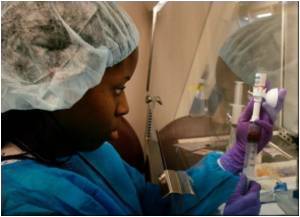It has emerged that a debilitating side effect of a widely used but harshly potent treatment for colon cancer could be eliminated if a promising new laboratory discovery bears fruit.

While it has proven a valuable tool for attacking tumors, CPT-11 can also cause severe diarrhea, which limits the dosage that patients can tolerate, curbing the drug’s potential effectiveness.
Now, a team of researchers led by Matthew R. Redinbo, Ph.D., from the University of North Carolina at Chapel Hill, has discovered it is possible to target and block the enzyme, beta glucuronidase, which was thought to play a major role in the gastric side effects.
First, the scientists had to overcome a major hurdle: the culprit enzymes are found in microbes in the gut that play a major role in human health, so eliminating the anticancer drug’s toxicity without making things worse for patients was a real challenge, Redinbo said.
“We need to retain our intestinal bacteria – they help us digest food, make critical vitamins and protect us from infection,” said Redinbo, professor and chair of the chemistry department in the UNC College of Arts and Sciences and a member of the UNC Lineberger Comprehensive Cancer Center. “This targeted approach stops the one bacterial protein thought to cause the drug’s devastating side effect, but without damaging the beneficial microbes or the intestines.”
The trouble with CPT-11 begins part way through the body’s process of excreting the drug, presumably after it has already killed tumor cells and been rendered inert. When it reaches the intestines, beta glucuronidase enzymes in the gut bacteria snip a sugar off the inactivated cancer drug, essentially reactivating it. The revived drug then causes tissue damage, which triggers the diarrhea seen as a side effect in the vast majority of patients who receive it, with up to 30 percent suffering severe diarrhea.
Advertisement
Instead of changing the makeup of the drug itself, Redinbo decided to take a new tack. Working with researchers at North Carolina Central University in Durham and the Albert Einstein College of Medicine in New York, the UNC team looked for chemical compounds that would latch on to and block the action of the beta glucuronidase enzymes. From a database of more than 10,000 compounds, they narrowed the field to four prime candidates, then tested them in the laboratory on several types of bacterial cells.
Advertisement
“With further development, this approach could improve anticancer drug efficacy and tolerance,” Redinbo said. “In general, though, this also shows that specific bacterial proteins can be selectively targeted without killing these health-promoting microbial symbiotes.”
Study co-author, Sridhar Mani, M.D., professor of medicine and genetics at Einstein, said the severe diarrhea caused by CPT-11 can sharply limit the dosage that cancer patients can receive. “Our tests showed conclusively that the inhibitor identified by our UNC colleagues prevented diarrhea in mice that were also receiving CPT-11. We’re hopeful that clinical trials will show that administering this inhibitor when patients start taking CPT-11 allows for improvement in the drug’s anti-tumor effect in patients with cancer.”
The research was funded by the National Institutes of Health, the Golden Leaf Foundation and the State of North Carolina.
Other study co-authors were graduate students Bret D. Wallace and Jillian Orans, and postdoctoral fellow Kimberly T. Lane, Ph.D., all from the UNC chemistry department; Ja Seol Koo, M.D., and Christian Jobin, Ph.D., from the medicine department in the UNC School of Medicine; Hongwei Wang, Ph.D. and Madhukumar Venkatesh, Ph.D., from the departments of medicine, oncology and genetics at the Albert Einstein College of Medicine; and John E. Scott, Ph.D., and Li-An Yeh, Ph.D., with the Biomanufacturing Research Institute and Technology Enterprise program at N.C. Central University.
Footnote: Big disease, small world
Redinbo, the study’s lead author, was motivated to tackle the problem of curbing CPT-11’s side effects after seeing the treatment’s debilitating impact on a colleague, Lisa Benkowski, who contracted colon cancer and subsequently died in 2003.
For a long time, he did not share this with the members of his research team because he did not want to risk putting undue pressure on them. But as their work progressed and appeared to be proving successful, he told them – and found out that the graduate student performing the central studies, Bret Wallace (the paper’s first author), had exactly the same experience: a family friend, Stacey Micoli, was diagnosed with cancer in 2006, treated with the same drug, suffered the same way and died last year.
Both women are cited in the acknowledgements section of the study.
“It’s remarkable to me that we both had personal reasons to find a way to improve CPT-11 tolerance,” Redinbo said. “We only talked about it well into the project, when I shared my story about Lisa, and Bret followed with his about Stacey.”
“This paper is a testament to the fact that as scientists, our experiences can have a profound effect on our work, and that those experiences can translate from life, through the laboratory and – hopefully, in cases such as this – into patient clinics.”
Source-Eurekalert














